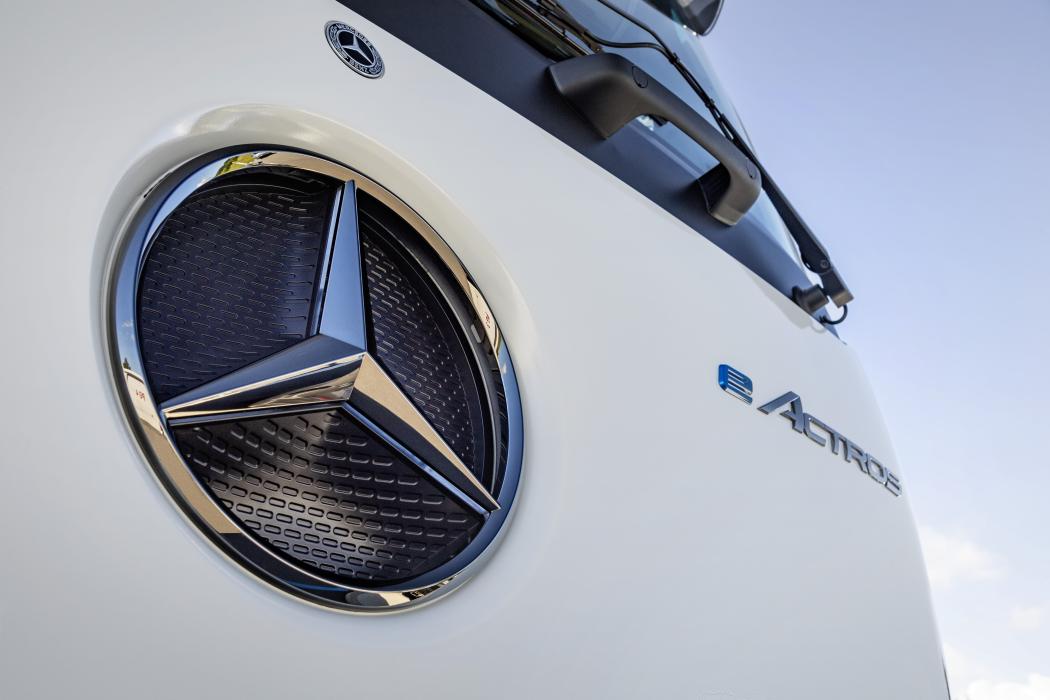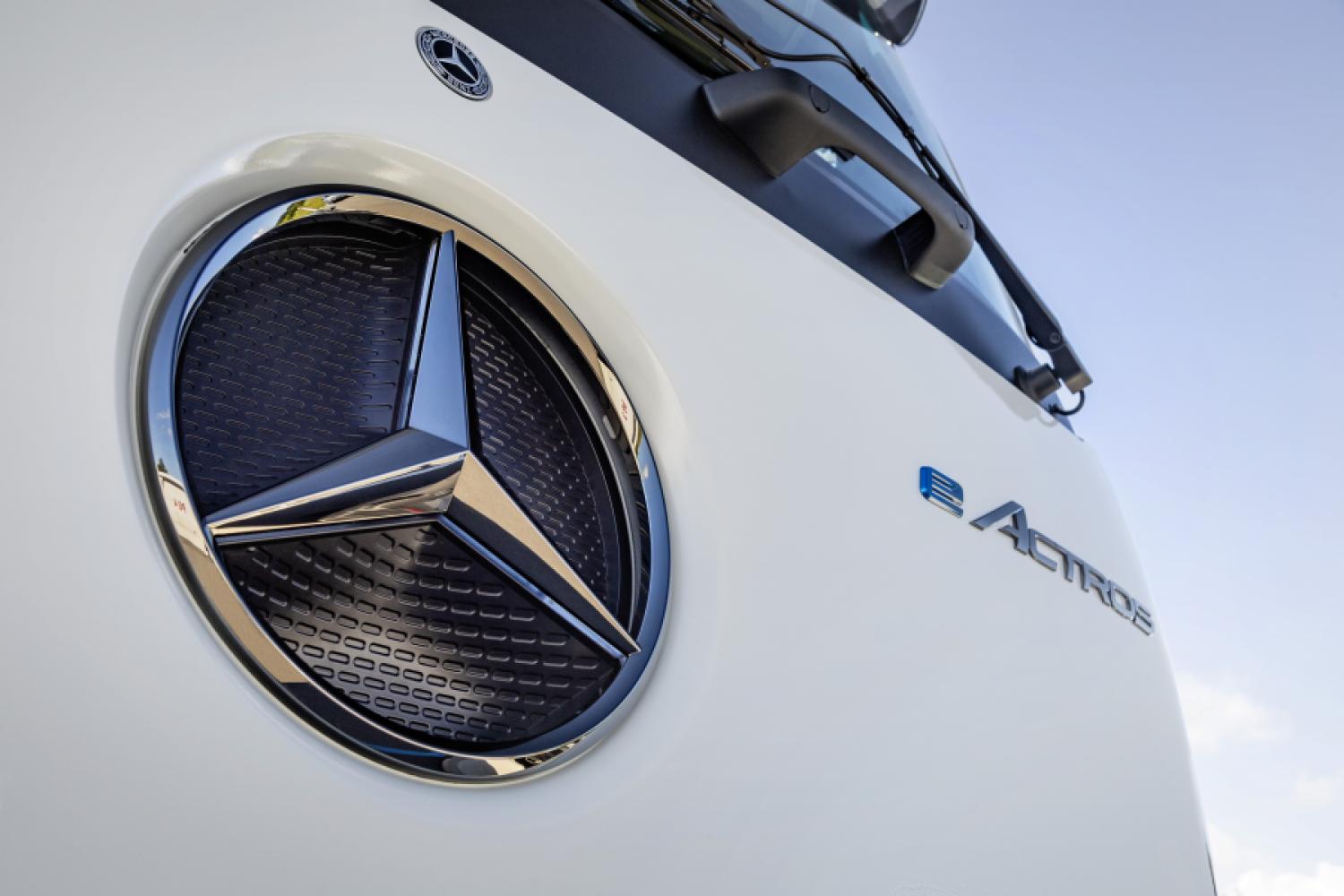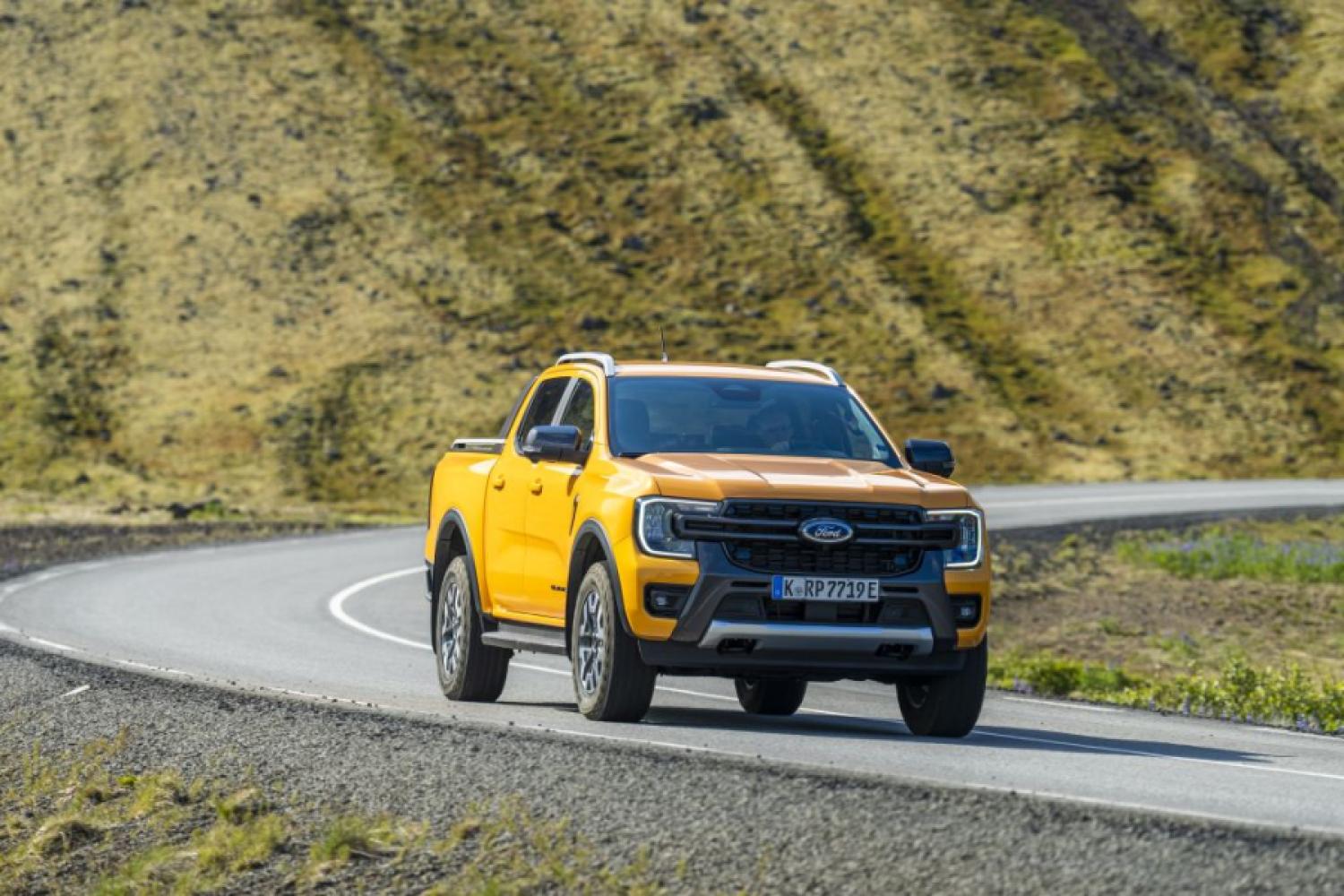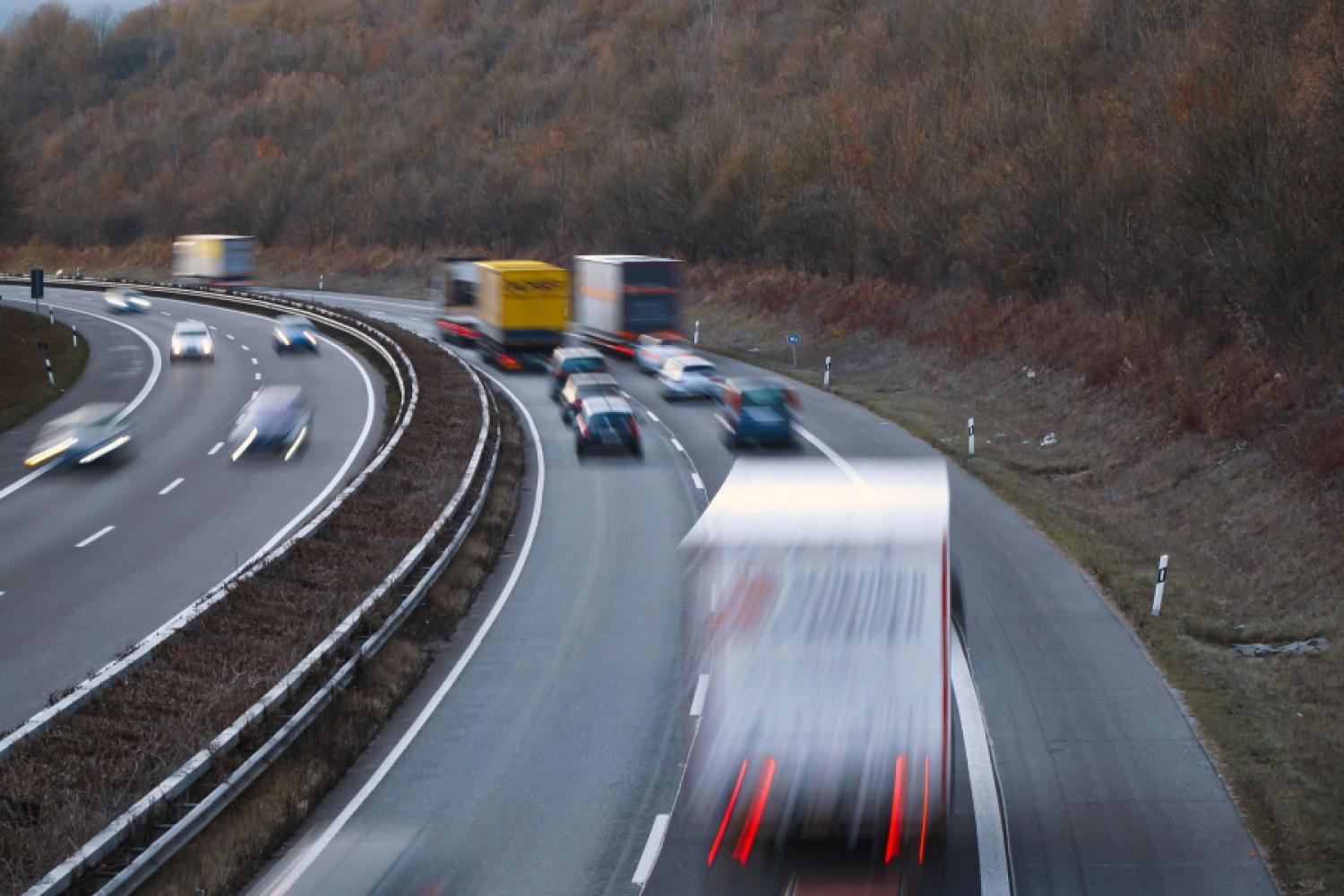Mercedes-Benz Trucks presented the eActros 600 to an international professional audience at the Break Autohof Hamburg Nordheide in October 2023 for the first time. The heavy battery-electric truck is Daimler Truck's answer to the electrification of European long-distance transport.
The eActros 600 features three battery packs with a total installed capacity of 621 kWh based on particularly durable and robust lithium iron phosphate cells (LFP). According to the manufacturer, the truck achieves a range of up to 500 kilometers without recharging—under realistic operating conditions, as Daimler Truck emphasizes. By recharging during legally required breaks, it can cover more than 1,000 kilometers daily. Megawatt charging (MCS) is also expected to be possible when available. The batteries can then be charged from 20 to 80 percent in about 30 minutes.
Hier berichtet LOGISTRA vom Wintertest des Mercedes-Benz eActros 600. Cold temperatures reduce the range of the electric truck, but the actual loss seems to be limited.
Integrated E-Axle and 22 Tons Payload
The drivetrain of the eActros 600 consists of a newly developed, integrated e-axle by Daimler Truck with two electric motors and a four-speed gearbox. It continuously provides 400 kW, with peaks of up to 600 kW. The electric truck is designed for a total train weight of up to 44 tons. With a standard trailer, the payload is about 22 tons.
Particular emphasis is placed on energy efficiency. The aerodynamically optimized driver's cab ("ProCabin") reduces air resistance and thus increases range. An improved recuperation—including one-pedal driving—reduces brake wear and feeds energy back into the battery. Daimler Truck describes one-pedal driving as when the truck decelerates so strongly through recuperation that the mechanical brake only needs to be used minimally. Additionally, predictive powertrain control uses navigation data for anticipatory control of the drivetrain and recuperation.
Assistance Systems: Brake Assist 6, Frontguard Assist, Sideguard Assist 2, and Drive Assist 3
The safety equipment of the eActros 600 is based on a sensor unit with six sensors that enable a 270-degree all-around view. Systems such as Active Brake Assist 6, Frontguard Assist, or Active Sideguard Assist 2 are included. They already surpass forthcoming legal requirements, according to the manufacturer. Semi-automated driving on Level 2 is possible with Active Drive Assist 3. For ancillary equipment such as refrigerated trailers or tipping bodies, the eActros 600 is equipped with electric auxiliaries. Digital services such as charging and maintenance management, tracking, or fleet management are provided via the Fleetboard portal and the multimedia cockpit.
The fully electric eActros 600 is a key component of Daimler Truck’s decarbonization strategy. The manufacturer aims to support transport companies in the economic transition to electromobility through a combination of vehicle, charging infrastructure, consulting, and services.
Series Launch and First Deliveries in 2024
The series production of the Mercedes-Benz eActros 600 began in November 2024 at the Wörth plant. Just weeks into production, the first vehicles were delivered. By the end of 2024, approximately 50 battery-electric long-distance trucks had been handed over to customers in Germany.
The first series vehicles were largely delivered to forwarding and logistics companies that are early adopters of climate-friendly transport solutions. Initial customers include August Gschwander Transport GmbH, Blue Känguru GmbH, Brummer Logistik GmbH, Contargo GmbH & Co. KG, Contrail-Transport GmbH & Co. KG, Denkinger Internationale Spedition GmbH, Ralf Reyser Transporte & Logistik, Schade Logistic GmbH, and Wessels Holding GmbH & Co. KG.
Support from the KsNI Funding Program by the Federal Ministry for Digital and Transport
According to Daimler Truck, the delivery to customers within the same year was made possible by the KsNI funding program of the Federal Ministry for Digital and Transport. It supported the acquisition of zero-emission commercial vehicles and the corresponding charging infrastructure. The process was handled by the Federal Office for Logistics and Mobility, coordinated by NOW GmbH (National Organisation Hydrogen and Fuel Cell Technology).
In the initial months after production started, many vehicles were initially retained as demonstration models in branches and with trading partners. At the same time, the first customers gained operational experience in regular long-distance operations. Feedback from these early deployments directly fed into the further development of products, services, and infrastructure—with the goal of establishing battery-electric long-distance transport as the new norm in the heavy-duty segment.
Mercedes-Benz eActros 600 - Users (as of July 2025)
- Amazon
- DHL Group
- Spedition Gschwander
- Fachspedition Karldischinger
- Logistik Schmitt
- Spedition Nanno Janssen
- Spedition W&P
- Wessels Logistik
But where is the Mercedes-Benz eActros already in use and where will it operate next? And what operations do practitioners trust the electric truck with? LOGISTRA has researched and presents the key users and scenarios: from A for Amazon to W for Wessels.
Not only Daimler Truck is electrifying truck transport. Here, LOGISTRA has researched, for example, where the MAN eTGX is already in use.
Amazon Orders Over 200 eActros 600: Largest E-Truck Order for Mercedes-Benz Trucks
Amazon is massively investing in
expanding its sustainable logistics: At the beginning of 2025, the online retailer ordered 202 battery-electric trucks of the eActros 600 type from Mercedes-Benz Trucks. This is the largest e-truck order the company has placed worldwide to date—and simultaneously the largest individual order for electric trucks in the manufacturer's history. The vehicles are to be integrated into Amazon’s European "middle-mile" transport network starting in 2025, transporting freight containers between fulfillment centers, sorting centers, and delivery stations in Germany and the UK. Overall, the zero-emission vehicles are expected to cover over 20 million kilometers annually and transport more than 350 million packages without CO₂ emissions.
The decision was preceded by a practical test with a near-production prototype of the eActros 600 at a German logistics center of Amazon. Andreas Marschner, Vice President of Worldwide Operations Sustainability at Amazon, emphasizes the strategic significance of the order: It marks an important step towards electrifying the European transport network and underscores the goal of achieving CO₂ neutrality in all business areas by 2040. For Daimler Truck, Amazon is a key customer on the journey to climate-neutral freight transport. With the deployment of e-trucks, Amazon is pursuing its sustainability strategy while simultaneously expanding its logistics infrastructure in Europe.
DHL Expands Zero-Emission Fleet with 30 Electric Trucks from Daimler Truck
The DHL Group is strengthening its commitment to climate-friendly logistics solutions and acquiring 30 fully electric trucks from Daimler Truck. The vehicles, Mercedes-Benz eActros 600 type, are provided through commercial vehicle leasing company Hylane. The "pay per use" rental model enables usage-based billing, allowing DHL to flexibly expand its fleet without significant upfront costs. The cooperation agreement was concluded at the transport logistic 2025 trade fair in Munich.
The trucks will be used in the Post & Parcel Germany division for transport between parcel centers. Delivery is scheduled for completion by the end of the second quarter of 2026. For DHL, the project is another step towards climate-neutral logistics. The new vehicles complement an already extensive sustainable fleet, which includes e- and CNG-trucks as well as tens of thousands of electric delivery vans for the last mile.
The project is supported by the now-expired KsNI funding program of the federal government, which favored investments in low-emission commercial vehicles. The cooperation is intended to further accelerate the transformation in heavy-duty transport and contribute to the company's own climate goals. By 2050, DHL aims for emission-free logistics; by 2030, approximately one-third of the transport fleet should be equipped with alternative drives.
Spedition Gschwander Starts with eActros 600 – First Interim Report After a Few Months
Since the beginning of 2025, August Gschwander Transport GmbH from Teningen in the southwest of Baden-Württemberg has been using four fully electric eActros 600 trucks from Mercedes-Benz Trucks. The vehicles were handed over shortly before Christmas 2024 at the Wörth plant and have been in daily use ever since—crossing borders into Alsace and Switzerland and navigating challenging routes through the Swabian Alb and the Black Forest. The forwarding company is one of the first users of the model in Germany, taking a pioneering role in the transformation to climate-neutral freight transport.
The medium-sized company with around 180 towing units is foregoing transitional technologies such as liquefied natural gas (LNG) or synthetic fuels, opting instead for battery-electric drives. The goal is entirely CO₂-free transport. The decision for the eActros 600 was made, among other reasons, due to its high range of around 500 kilometers, which the operator claims is confirmed in real-world operations. The vehicles have three lithium iron phosphate battery packs with a total capacity of over 600 kilowatt hours.
However, the scheduling of tours required adjustments, particularly with regard to intermediate charging on the route. A comprehensive public charging infrastructure is still lacking, it is said. With its own decentralized network of seven fast-charging stations at five locations, Gschwander has so far been able to overcome this hurdle. Two more e-trucks are already on order, and the expansion of charging infrastructure continues with the installation of its own photovoltaic system and storage solution. This will in future also enable charging with the company’s own green power.
The drivers apparently welcomed the vehicles, with younger drivers in particular appreciating the new driving experience and the modern image. Mercedes-Benz Trucks supported the company with driver training and consulting on the setup of charging infrastructure. The introduction of the electric trucks was supported as part of the KsNI funding program (climate-friendly commercial vehicles and infrastructure) with around 2.4 million euros by the Federal Ministry for Digital and Transport.
Gschwander draws a positive interim conclusion after several months of operation, even though challenges such as lower payload due to battery weight and the organizational effort required for charging remain. The higher gross tonnage allowed for the all-electric truck does not offset the weight of the battery packs.
Over 100 Years of Mercedes-Benz Trucks at Karldischinger
– eActros Marks New Milestone
For over 100 years, the specialist forwarding agency Karldischinger has relied on trucks from Mercedes-Benz. The logistics provider has incorporated every major development from wood gas and diesel to electric trucks into its operations. In the anniversary year 2024, the commissioning of one eActros 300 Lowliner marks a key step in the company’s decarbonization strategy. The Mercedes-Benz Trucks eActros 600 is the advancement of the eActros 300.
Together with Daimler Truck, the company now aims to procure a total of 100 zero-emission trucks by 2029. This was officially sealed by signing a letter of intent in September 2024. Depending on the application profile, battery-electric or, in the future, hydrogen-powered vehicles will be used.
As early as 1995, Karldischinger gained initial experience with alternative drives through the use of the Atego BlueTec Hybrid in city traffic in Freiburg. The current fleet consists of approximately 120 predominantly Mercedes-Benz trucks with an average age of two years. Even though transport today accounts for only 20 percent of sales, the company’s own fleet remains a central component of the corporate strategy.
Logistics Schmitt Relies on Cross-Border E-Mobility in Long-Distance Transport
The Baden-based logistics and contract logistics provider Schmitt from Bietigheim received the first five series vehicles of the battery-electric Mercedes-Benz eActros 600 in July 2025. Overall, the order includes 23 vehicles with which the company plans to gradually electrify its fleet. The handover took place at the Mercedes-Benz plant in Wörth. With the entry into series use of the eActros 600, Schmitt continues its long-standing collaboration with Mercedes-Benz Trucks, which began as early as 2019 with practical tests of the eActros 300.
Even then, Schmitt tested initial prototypes on a route of around seven kilometers between its warehouse in Ötigheim and the Mercedes-Benz Gaggenau plant in Rastatt—initially in daily use in three-shift operation covering about 168 kilometers. From 2021, the vehicles were replaced by more series-ready models, and since 2023, six eActros 300 semi-trailer tractors are in use in multi-shift operation for Daimler Truck’s plant logistics. In parallel, Schmitt was also involved in the testing of the eActros 600, which was, among other things, tested on cross-border long-distance routes between Germany and Hungary.
Since May 2025, Schmitt has been testing two eActros 600 prototypes as part of a six-month project on a 1,000-kilometer circuit between the Daimler Buses location in Mannheim and a supplier near Leipzig. The vehicles are charged at charging points at the Mannheim plant and the Hermsdorfer Kreuz. This project is part of the "Electrify Inbound Logistics" initiative, in which a total of 14 partner companies take on selected long-haul routes for the supply of the Mercedes-Benz plant in Wörth with CO₂-neutral transport.
With its own charging infrastructure and the integration of the eActros 600 into its fleet, Logistics Schmitt affirms its commitment to sustainable transport solutions. The vehicles are to be used on national and international routes in the future. Daimler Truck supports this transformation with its own charging infrastructure offering "TruckCharge" and the establishment of a European charging network for e-trucks.
Spedition Nanno Janssen Electrifies Majority of Fleet – Ten Mercedes-Benz eActros 600 in Use
The forwarding company Nanno Janssen GmbH from Leer in Lower Saxony is converting its truck fleet on a large scale to electromobility. Already 27 out of 75 company-owned vehicles are electric. By the end of 2025, the number is expected to rise to 50—more than two-thirds of the entire fleet. The company extensively tests electric trucks from various manufacturers. In mid-June, the forwarding company took delivery of the first five of a total of ten ordered Mercedes-Benz eActros 600 at the Wörth am Rhein plant. The remaining vehicles are to follow in the coming weeks.
With the switch to fully electric drives, the management consistently excludes the further use of diesel trucks—with the exception of legally restricted transports of pyrotechnic hazardous goods in class 1. The entry of junior Nanno Janssen into management three years ago marked the beginning of the transformation process. Thanks to funding from the former KsNI program (climate protection through sustainable mobility), the company initially applied for 20 electric trucks. Since then, the electric fleet has been growing steadily.
At the same time, the forwarding company is investing heavily in charging infrastructure. A dedicated charging park with 20 charging points and a grid connection of four megawatts was put into operation at the company’s headquarters in Leer at the end of June 2025. The facility also includes a battery storage system with 1.3 MW power and a photovoltaic system with 800 kWp. It allows multiple vehicles to be charged simultaneously with up to 300 kW per charging point and is designed for further growth.
The initial experiences at Nanno Janssen are already revealing savings potentials. On the transfer drive from Wörth to Leer, the vehicles reportedly consumed only 60 kWh per 100 kilometers
without a trailer. Drivers like the well-known "electric trucker" Tobias Wagner praise the driving comfort, acceleration, and quietness of the new vehicles. Wagner documents the fleet conversion on his YouTube channel, which reaches nearly 60,000 subscribers.
Economically, the company also sees advantages. Although acquisition costs are significantly higher, operating costs are lower. Without funding, the total costs over the lifetime are about comparable to those of a diesel truck, it is said.
The forwarding company Nanno Janssen, founded in 1896, employs around 120 people in Leer and 20 more at the Fulda site. In addition to traditional forwarding and specialized transport, the company also offers warehouse logistics and moving services. By electrifying its fleet, the medium-sized forwarding company is taking on a pioneering role in German heavy transport.
Spedition W&P: 20 eActros 600 and Charging Park with 56 Fast Charging Points Commissioned
The forwarding company W&P from Prichsenstadt in Lower Franconia took a significant step towards climate-friendly freight transport at the end of May 2025. The medium-sized transport company expanded its fleet with 20 battery-electric trucks of the Mercedes-Benz eActros 600 type and simultaneously commissioned its own charging park on the premises. With this investment, W&P consistently continues its strategy of electrifying the fleet.
Even before the current expansion, the company was operating daily long-distance transport with three eActros 300 over routes of around 480 kilometers. The recently delivered eActros 600 complement the existing fleet of about 50 trucks, previously mostly diesel-powered. According to managing director Alexander Wehr, the decision to expand e-mobility is a logical consequence of the company’s focus. As a logistics provider specializing in recycling and the textile industry, W&P relies on sustainable and future-proof transport solutions.
The new charging park features 56 DC fast charging points and is powered by an in-house photovoltaic system and a stationary power storage with 15,000 kilowatt hours. The location of the company near the A3 motorway and the B286 federal road allows strategic integration into the regional delivery network. During the charging process, drivers have access to modern sanitary facilities, recreation rooms, and catering options.
The handover of the vehicles took place during an opening ceremony at the company headquarters. The project was supported by Mercedes-Benz Trucks as part of the TruckCharge program, which includes vehicle sales, consulting on charging infrastructure, and procurement of funding. With the investment in vehicles and the charging park, W&P is among the pioneers in regional road freight transport on the path to CO₂-neutral logistics.
Wessels Logistik Electrifies Long-Distance Fleet and Expands Charging Infrastructure
The logistics service provider Wessels Logistik from Rhede in Münsterland is pushing ahead with the electrification of its fleet. Since the end of February 2025, two fully electric semitrailer tractors of the eActros 600 type have been in two-shift operation.
One eActros 600 has a longer day and a slightly shorter night tour. The daily output covers about 350 kilometers. Another 220 kilometers are added at night when the vehicle heads to the Düsseldorf regional hub of the general cargo cooperation. For the other eActros 600, it is the other way around: At night, it has a demanding 560 kilometers to cover when it sets out for the cooperation's central hub in Homberg/Efze. The cooperation plans to install charging columns there. Until these become available, the electric truck must recharge en route at public charging infrastructure. This currently happens at public charging infrastructure in Hesse's Knüllwald. To compensate for its long nighttime journey, the truck is given more respite during the day, undertaking trips with ranges of about 200 kilometers. Combined daily and nightly distances amount to a total of 570 or 760 kilometers within 24 hours.
Continuous operation reportedly allows Wessels Logistik to maintain high utilization rates and reduce operating costs, especially as the vehicles are exempt from German road tolls until at least the end of 2026.
Wessels Logistik, a fourth-generation family business, is thus setting a clear signal for sustainable transport solutions in long-distance traffic. The fleet is set to grow further in the coming months, including the addition of another semitrailer and further electric-powered semitrailer tractors. Concurrently, the company is investing in charging infrastructure: By the end of June 2025, a charging park with multiple fast charging stations and a battery storage system will be built on the premises, powered in part by a new photovoltaic system.
The company is open to cooperation and plans to make its charging points available to other fleet operators in the future. Managing Director Andre Wessels supports Daimler Truck's plans to create a semi-public charging network under the TruckCharge brand. The goal is to exploit synergies within the industry and jointly shape the energy and drive transition.
Wessels Logistik employs around 185 people and operates over 100 of its own vehicles, approximately 70 of which are Mercedes-Benz. The decision to venture into e-mobility in long-distance transport is part of






